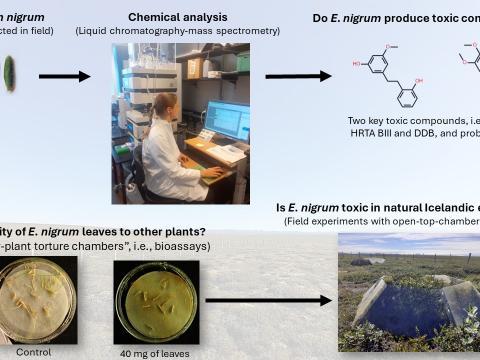Ingvild Ryde, PhD candidate at Faculty of Life and Environmental Sciences, University of Iceland, will present:
Occupied territory? - Allelopathic effects of Empetrum nigrum and its role in preventing the recovery of Icelandic ecosystems trapped in degraded states
Some plants wage war against each other through chemical warfare (allelopathy), i.e., by the release of toxic specialized metabolites (allelochemicals). Crowberry (Empetrum nigrum) might contribute to the trapping of ecosystems in degraded states in Iceland, by “occupying territory” through the release of allelochemicals preventing seedling establishment of other plants. My aim is to improve our knowledge of the role of E. nigrum in preventing ecosystem recovery of degraded rangelands in Iceland. I have performed bioassays (aka “baby-plant torture chambers”) to assess the allelopathic capacity, and chemical analyses (liquid chromatography-mass spectrometry) to assess the chemical arsenal, of Icelandic E. nigrum. Preliminary results, show that Icelandic E. nigrum releases two key allelochemicals, i.e., Batatasin-III (BIII) and 3,4-Dimethoxy-2´,5-dihydroxybibenzyl (DDB), and inhibit early development of the grass species Festuca richardsonii. Further studies will assess how different soil types impact E. nigrum’s allelopathic capacity, and analyze E. nigrum’s chemical profile (untargeted metabolomics) in search of other potential allelochemicals besides BIII and DDB. Furthermore, field experiments will assess the effects of warming and grazing-cessation on E. nigrum’s chemical arsenal and allelopathic effects in natural Icelandic ecosystems.
Join the seminar in room N-131 or on Zoom:
https://eu01web.zoom.us/j/69284007083
Meeting ID: 692 8400 7083
